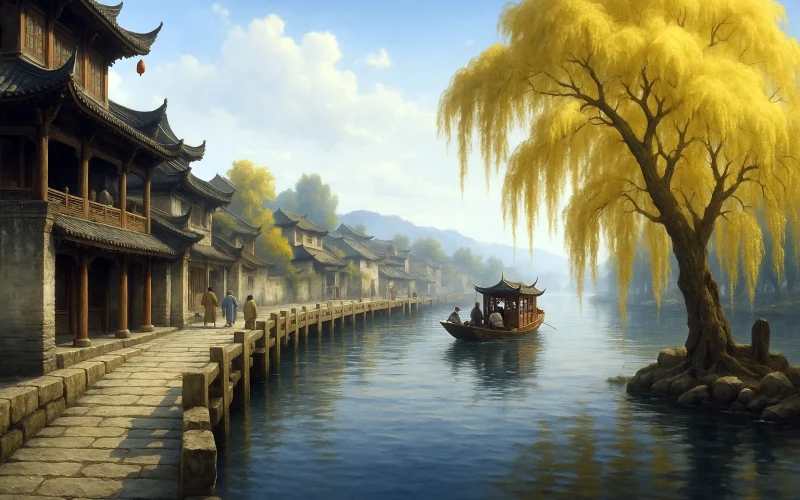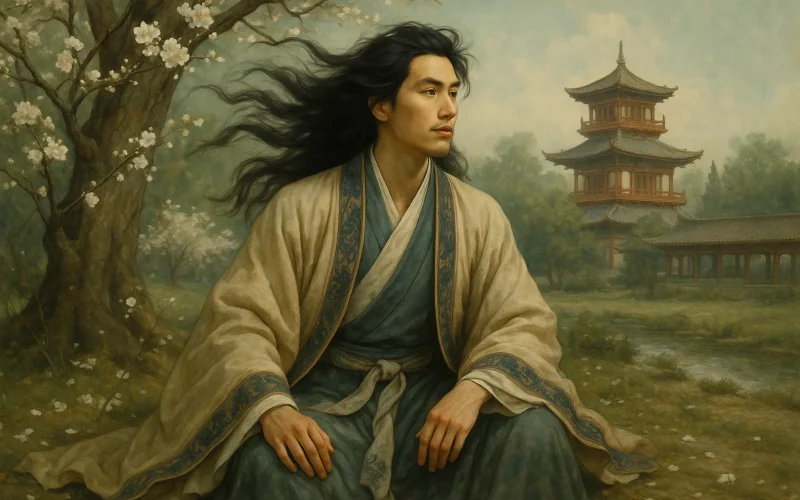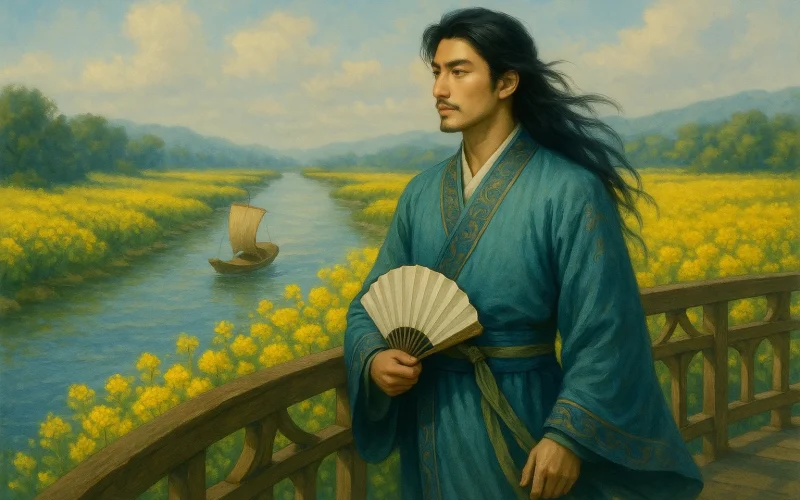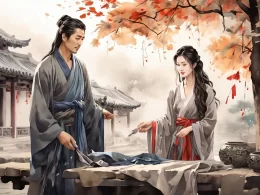Spring rivers bear your boat—no need for haste—
South to Xuzhou, where willow-down flies light.
By Red-Bird Bridge, watch Huai's waves in their chase,
In Black-Robe Lane, ask where Wang clans alight.
A thousand streets, ten thousand wells at rest—
Doors open wide to emerald hills' embrace.
Chu morns descend on Stone-Town's crest,
Temple of Tiles sees paired swallows race.
Wu's scholars, charming as the breeze,
Will greet you with new-wrought delight.
Here, some still praise the northern cheese,
But southern herbs will steal your appetite!
Original Poem
「送客之江宁」
韩翃
春流送客不应赊,南入徐州见柳花。
朱雀桥边看淮水,乌衣巷里问王家。
千闾万井无多事,辟户开门向山翠。
楚云朝下石头城,江燕双飞瓦棺寺。
吴士风流甚可亲,相逢嘉赏日应新。
从来此地夸羊酪,自有莼羹定却人。
Interpretation
This poem was composed during the mid-to-late Tang period by Han Hong as a farewell piece for a friend departing to assume office in Jiangning (modern Nanjing). Though the identity of the recipient remains unknown, the verses trace a journey south through Xuzhou, past landmarks like the Vermilion Bird Bridge and Black Robe Lane before reaching Jiangning. Han Hong masterfully interweaves depictions of Jiangning's natural scenery and cultural heritage with auspicious wishes for his friend's official career. While maintaining the polished rhetoric characteristic of occasional poetry, the work flows with lyrical ease, showcasing the poet's signature literary brilliance.
First Couplet: "春流送客不应赊,南入徐州见柳花。"
Chūn liú sòng kè bù yīng shē, nán rù Xúzhōu jiàn liǔ huā.
Spring floods bear travelers without delay—
Southbound through Xuzhou where willow catkins play.
The opening establishes seasonal and geographical context through fluid imagery. The "spring floods" (春流) symbolize both the timely journey and the natural momentum of official advancement, while "willow catkins" (柳花) embody the buoyant spirit of departure. This couplet artfully merges the hydrological with the arboreal to suggest favorable winds for the friend's career.
Second Couplet: "朱雀桥边看淮水,乌衣巷里问王家。"
Zhūquè qiáo biān kàn Huái shuǐ, Wūyī xiàng lǐ wèn Wáng jiā.
By Vermilion Bird Bridge, Huai River's view,
In Black Robe Lane, the Wang mansions ask after you.
Historical memory permeates these lines through iconic Jiangning landmarks. The bridge and lane—once aristocratic domains of Jin dynasty elites—become cultural waypoints on the friend's journey. The personification of "Wang mansions asking" (问王家) animates history itself welcoming the new official, blending past prestige with present appointment.
Third Couplet: "千闾万井无多事,辟户开门向山翠。"
Qiān lǘ wàn jǐng wú duō shì, pì hù kāi mén xiàng shān cuì.
A thousand lanes, ten thousand wells—no strife,
Open your gate to emerald mountain life.
This pastoral vision presents Jiangning as an administrative ideal. The numerical parallelism "thousand lanes, ten thousand wells" (千闾万井) suggests thriving order, while "emerald mountains" (山翠) framing domestic space create a Confucian harmony between civic duty and natural repose—an auspicious omen for the friend's governance.
Fourth Couplet: "楚云朝下石头城,江燕双飞瓦棺寺。"
Chǔ yún zhāo xià Shítou chéng, jiāng yàn shuāng fēi Wǎguān sì.
Chu's morning clouds descend on Stonefort Town,
River swallows twin-flight through Temple of the Earthen Crown.
Dawn transforms Jiangning into a kinetic painting. "Chu clouds" (楚云) and "river swallows" (江燕) imbue the scene with regional character, while the ancient fort and temple grounds (瓦棺寺) anchor the tableau in historical continuity. The "twin-flight" (双飞) motif particularly suggests harmonious companionship awaiting the traveler.
Fifth Couplet: "吴士风流甚可亲,相逢嘉赏日应新。"
Wú shì fēngliú shèn kě qīn, xiāngféng jiā shǎng rì yīng xīn.
Wu's scholars—gracious, refined,
Each new meeting with them will delight your mind.
Here the poet assures cultural compatibility. The "gracious scholars" (风流甚可亲) of Wu region represent both intellectual community and bureaucratic network, while "each new meeting" (日应新) promises daily renewals of professional and personal fulfillment—a subtle reminder of the social dimensions of official life.
Sixth Couplet: "从来此地夸羊酪,自有莼羹定却人。"
Cónglái cǐ dì kuā yáng lào, zì yǒu chúngēng dìng què rén.
Though northern curds earn constant praise,
Our southern water-shield soup stays the heart always.
The closing culinary metaphor achieves multiple resonances. By comparing northern dairy (羊酪) to Jiangning's signature water-shield soup (莼羹), the poet simultaneously: 1) comforts homesickness through local delicacies 2) suggests regional virtues surpass central plains' offerings 3) implies the friend's eventual emotional rootedness in his new post. The "stays the heart" (定却人) formulation particularly captures how local flavors become anchors of belonging.
Holistic Appreciation
This farewell poem Seeing a Guest Off to Jiangning is both a model of the parting genre and a vibrant Jiangnan landscape painting in verse. Beginning with spring waters as the departure setting, the poet traces the southbound journey through scenic highlights before arriving at Jiangning’s tranquil cityscape—its cultural heritage and natural beauty unfolding in seamless progression, each line a brushstroke of imagery.
The poem blends praise for Jiangning’s geography and history with blessings for the traveler’s future, concluding with a delightful culinary vignette. Han Hong’s rich diction incorporates allusions like the Vermilion Bird Bridge, Black Robe Lane, Stone City, and Tile-Coffin Temple—local landmarks that resonate culturally. Balancing topography with lyrical flow, this work exemplifies refined occasional poetry.
Artistic Merits
Lush in language and apt in allusion, the poem demonstrates masterful composition and structure. Its scenery shifts between grand vistas (Vermilion Bird Bridge, Huai River) and delicate motion (paired swallows in flight), while portraying people through terms like "cultured" and "admirable" to honor both Jiangning scholars and the departing friend. The whimsical food-themed ending adds warm encouragement without didacticism. Stylistically, it reflects Han Hong’s signature ornate craftsmanship—"abundant in zest" and "articulate in rhythm," as critic Gao Zhongwu noted.
Insights
The poem teaches that farewells need not dwell on sorrow; they can inspire through visions of the destination’s promise. With meticulous detail, Han Hong maps an idealized Jiangnan life for his friend, showcasing Tang literati’s artistic camaraderie and the aspirational grace marking official journeys. For life’s new chapters, the greatest parting gift is confidence kindled through beauty.
About the Poet
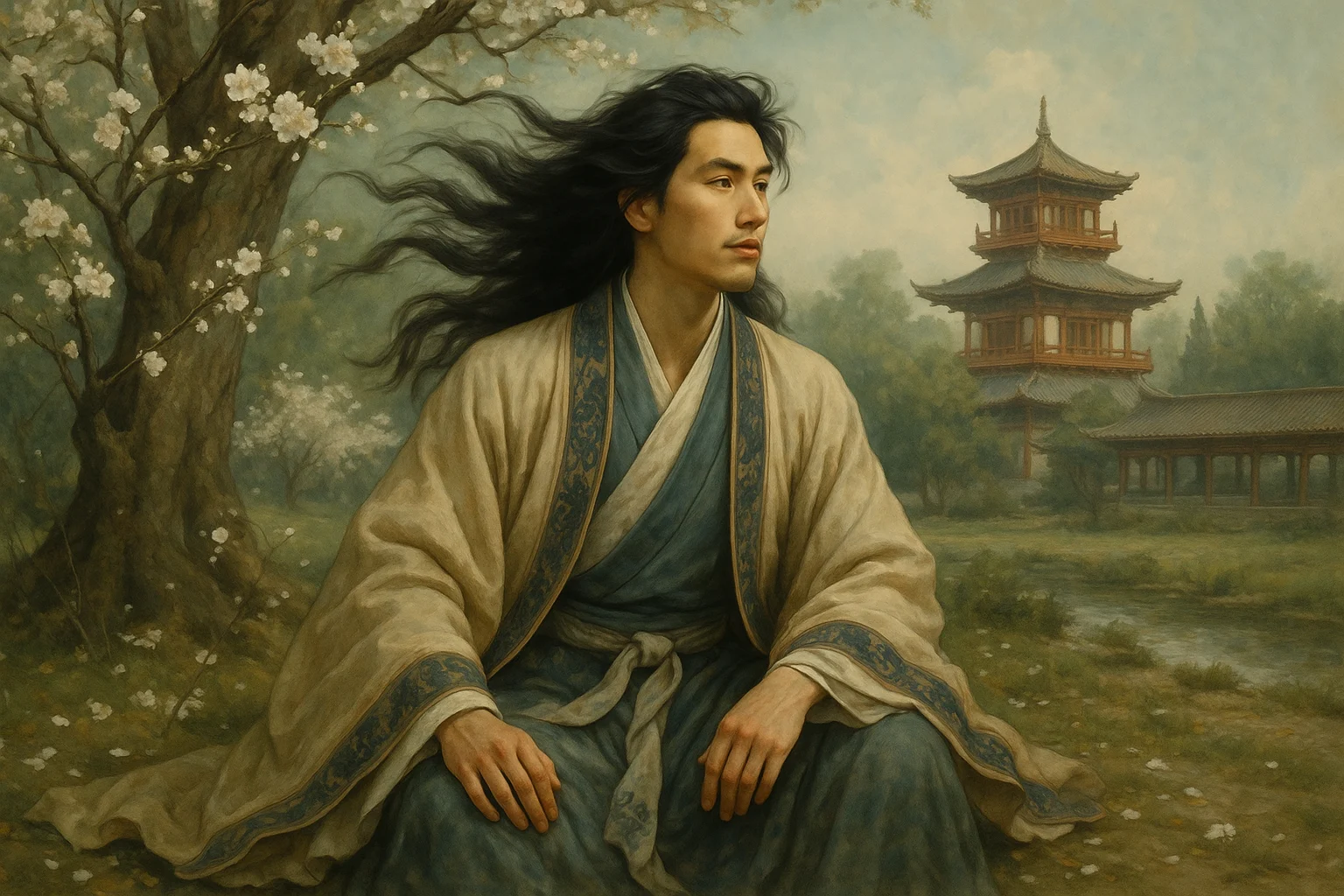
Han Hong(韩翃), a native of Nanyang, Henan, was one of the "Ten Literary Masters of the Dali era" (大历十才子). He was renowned for his poetry, particularly farewell and parting verses, which gained significant acclaim during his time. The Complete Tang Poems (《全唐诗》) preserves three volumes of his works.





